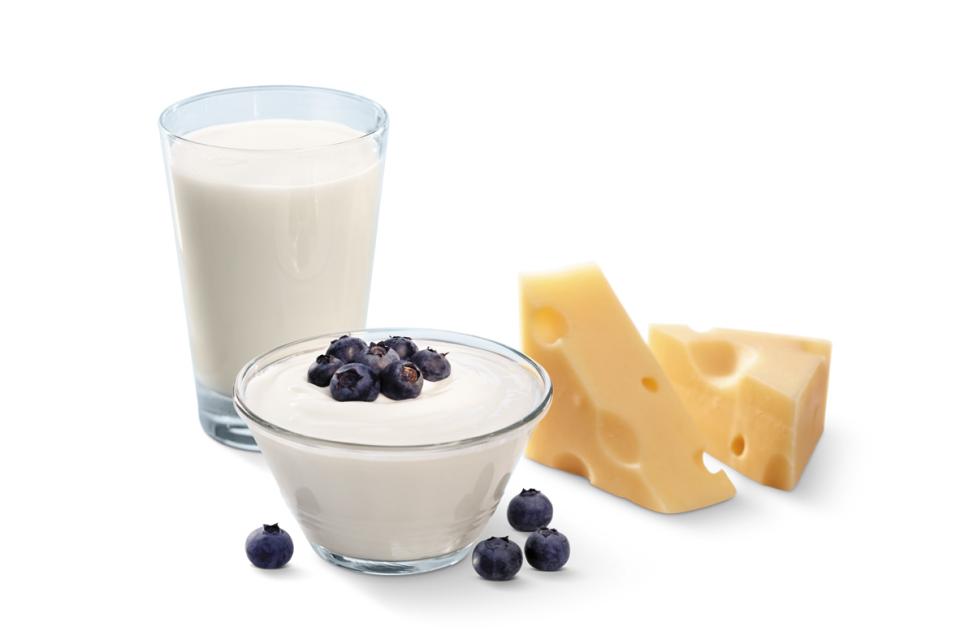In addition to providing an excellent source of complete protein, milk products are a key source 6 of the 8 essential nutrients many Canadians don’t get enough of:4
- calcium
- magnesium
- zinc
- vitamin A
- vitamin D
- potassium
Milk products are also a source of multiple B vitamins, phosphorus and selenium.
In Canada, a significant number of adults do not meet their requirements for many essential nutrients from the foods they eat.5 For example, the percentage of adults that do not meet their Estimated Average Requirements from food (i.e., the prevalence of inadequate intakes) is more than 44% for calcium, 45% for magnesium, 47% for vitamin A, and 94% for vitamin D.5
| Dairy Foods contribute significantly to Canadians’ overall nutrient intakes, such as: |
| 54% OF CALCIUM |
| 43% OF VITAMIN D |
| 29% OF VITAMIN A |
| 18% OF ZINC |
| 18% OF PROTEIN |
| 28% OF RIBOFLAVIN |
| 31% OF VITAMIN B12 |
| 28% OF PHOSPHORUS |
| 12% OF MAGNESIUM |
| 15% OF POTASSIUM |
Source: Statistics Canada. 2015 Canadian community health survey – Nutrition. Specific analyses requested by Dairy Farmers of Canada.
In practice
Milk products provide a unique bundle of up to 15 essential nutrients, including complete protein and calcium. Enjoying milk, cheese and yogurt is a simple way to get more of the nutrients our bodies need to build and maintain strong bones and support good health.
- Milk and other milk products naturally contain complete protein.
- Milk, cheese and yogurt are naturally rich in calcium the body can easily absorb.6
- Milk is an excellent source of vitamin D, needed for calcium absorption.7
- Key nutrients in milk products work together to support bone and immune health.1-3
Milk naturally contains complete protein
Milk products provide a unique combination of complete protein, calcium and other key nutrients that help to build strong bones in children and preserve bone and muscle mass in adults. Health Canada recognizes milk, cheese and yogurt as nutritious protein foods that contribute to the foundation for healthy eating patterns.8
Protein helps to build and repair body tissues, including muscles and bones throughout life. It also plays a role in the formation of antibodies our bodies use to fight infections. Plus, a healthy dose of protein facilitates muscle recovery after a workout.
The Canadian Pediatric Society and Dietitians of Canada advise parents that most plant-based beverages contain very little protein and are very low in fat and calories.9 Therefore, they may not be able to support good health and optimal growth in young children. Cow’s milk is an excellent source of protein; whereas, almond, rice or coconut drinks contain little to no protein.
Milk products are a leading source of calcium
Milk products, such as milk, cheese and yogurt, are a major source of calcium in the Canadian diet.10 While other foods may contain calcium, milk products generally provide more calcium, in a form that’s more easily absorbed than many other sources.6 Dairy calcium works along with many other nutrients in dairy foods, including protein, phosphorus, magnesium, vitamins A, D and K to build and maintain strong bones throughout life.1
Find out more about calcium recommendations here.
Milk is a major source of vitamin D in Canada
Milk is also a major food source of vitamin D in Canada, thanks to fortification.7,10 It’s one of the few foods such as fatty fish and eggs that deliver vitamin D needed for proper bone formation and maintenance. New research is also uncovering a potential role of vitamin D in supporting the immune system. Calcium and phosphorus absorption depend on vitamin D, which plays a critical role in preventing bone diseases such as rickets in children and osteoporosis in adults.7
Milk products are a source of many B vitamins
In addition to vitamin B12, which aids in red blood cell formation, milk products also contain many other B vitamins. These B vitamins include vitamin B6, riboflavin, niacin, thiamine and pantothenic acid which are involved in tissue formation, normal growth and in converting food into energy.
References
- Wallace TC et al. Dairy intake and bone health across the lifespan: a systematic review and expert narrative. Crit Rev Food Sci Nutr 2021;61:3661-3707.
- International Dairy Federation. 2020. Dairy’s role in supporting a healthy immune system. www.fil-idf.org. Accessed June 25, 2021.
- Calder PC et al. Optimal nutritional status for a well-functioning immune system is an important factor to protect against viral infections. Nutrients 2020;12:1181.
- Health Canada. 2016. Evidence review for dietary guidance: Summary of results and implications for Canada's Food Guide. Accessed June 25, 2021.
- Ahmed M et al. Nutrient intakes of Canadian adults: results from the Canadian Community Health Survey (CCHS)-2015 Public Use Microdata File. Am J Clin Nutr 2021; 114:1131-1140.
- Weaver CM and Plawecki KL. Dietary calcium: Adequacy of a vegetarian diet. Am J Clin Nutr 1994;59(suppl):1238S-1241S.
- Health Canada. 2020. Vitamin D and calcium: Updated Dietary Reference Intakes. www.canada.ca. Accessed June 25, 2021.
- Health Canada. 2019. Canada’s Food Guide: Canada’s Dietary Guidelines. Accessed June 25, 2021.
- Canadian Paediatric Society. 2017. Dietitians, paediatricians advise parents to exercise caution with plant-based beverages. www.cps.ca. Accessed June 25, 2021.
- Health Canada. 2016. Evidence review for dietary guidance: Technical report 2015. Accessed June 25, 2021.


